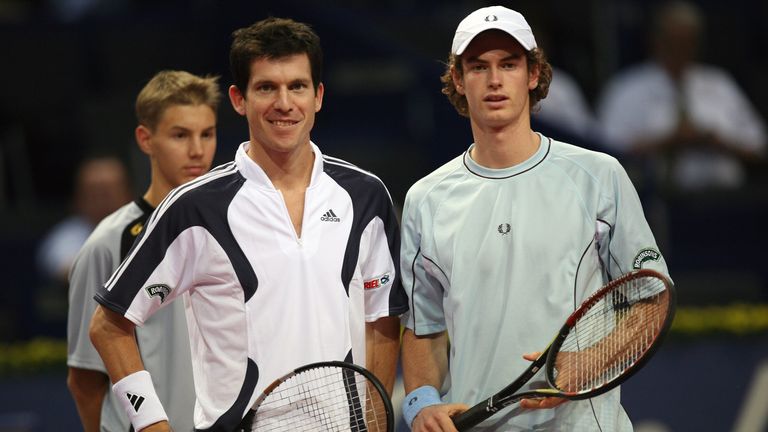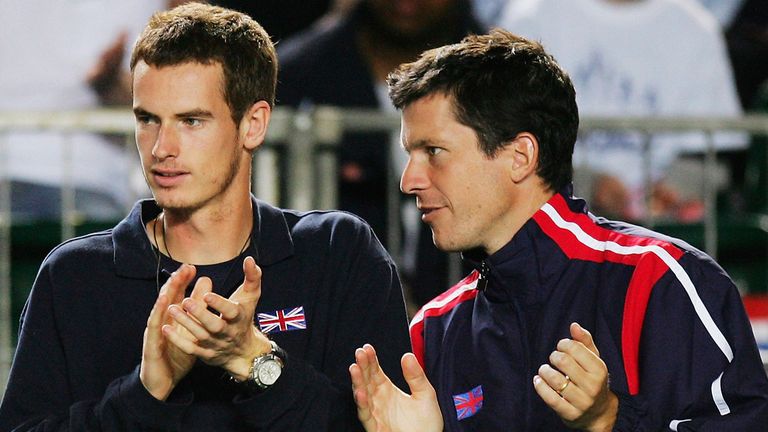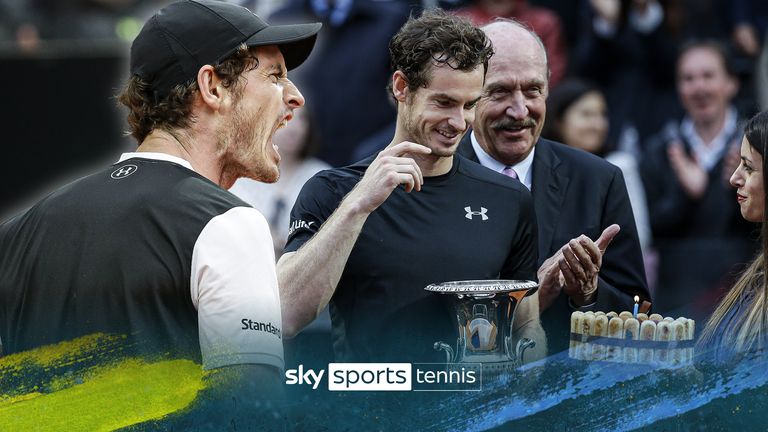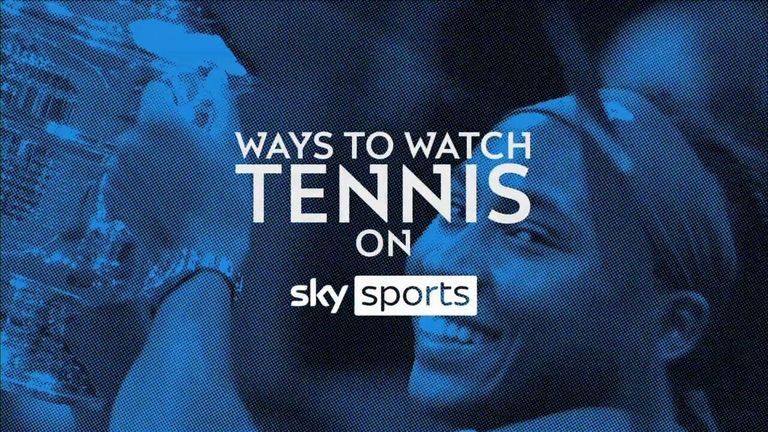Andy Murray’s illustrious tennis career came to an end while representing Team GB at the 2024 Olympics alongside Dan Evans on Thursday.
Despite some late resistance from the British pair, Murray and Evans were beaten by USA’s Taylor Fritz and Tommy Paul in the doubles quarter-finals.
Murray, a two-time gold medal winner and three-time Grand Slam champion, made an emotional farewell at Wimbledon earlier this month as he teamed up with brother Jamie in the doubles in his final appearance at the All England Club.
Speaking to Sky Sports for a special Murray documentary, Tim Henman shared his memories of the three-time Grand Slam champion, from his first impressions to his career legacy, and everything in between. You can watch ‘Andy Murray: Grit, Glory and Legacy’ on Sky Sports Tennis from 8am on Friday and on Demand.
When did you first hear of Andy Murray?
“I first heard of him when he was probably 14 or 15 and playing some junior events and then looking at playing the Futures level of tournaments.
“The first time I really spent any time with him was 2004, just after I’d lost in the semi-finals of the US Open and he had just won the junior event.
“We were in pre-Davis Cup training camp in La Manga in Spain and we were practising on clay. That was the first time I really spent any time with him and was able to see him on the practice court. “
First impressions of Murray?
“At that stage he was in a very different environment. He was a bit shy, but I think you immediately understood that he was a student of the game and he was really soaking up all the information and all the goings on around Davis Cup.
“We were obviously at a much higher level than him, but you could tell that he had a belief. It’s where he wanted to be.
“It’s where he thought he would be and, from those early days, it was pretty impressive to see how rapidly he went through the ranks.”
What made Murray reach the next level?
“In tennis, you need all the different attributes. Physically, you’ve got to have the speed, the balance and the footwork, but you’ve got to be able to do that for four, five or even six hours.
“Andy had targeted all those different areas. He was such a good athlete, and being a counterpuncher and his defensive skills have played a huge part in Andy’s success.
“The work that he has done, whether that be on the practice court, on the track or in the gym, it’s safe to say he has left no stone unturned and has got absolutely everything out of his game.”
Negative press, including 2006 World Cup “anyone but England” comments
“I remember a lot, because I was doing the interview with him. We were at Wimbledon and we were just walking with the journalists and I think a photographer, trying to find a place where we were going to sit down and do this interview.
“We were talking about the World Cup because it was World Cup year and there was a lot of chat and quite a lot of banter from me, criticising the lack of quality in the Scottish team and just normal banter really.
“The journalist sort of laughed and said to Andy: ‘Who are you going to be supporting?’ and he just said, like any Scottish person would have said after that conversation: ‘I’ll support anyone that’s playing England’.
“We sat down and did the interview, where we spoke for an hour and we didn’t talk about the World Cup or football once, so that type of headline was very unfair given the circumstances and he suffered from that.
“There was definitely a period of time where that probably influenced people’s perceptions around Andy, but it couldn’t have been further from the truth. He has lived in England for a long time and his wife is English, so that was a difficult period.”
Memories of playing alongside Murray
“He is someone I’ve got to know very well from those early years. The last event that I ever played in as a professional was the Davis Cup at Wimbledon against Croatia, a World Group qualifier.
“On the Friday I played singles and Andy played the other singles and we both won to go up 2-0, then on the Saturday I played doubles with Jamie, so my last professional competition was partnering both Murrays.”
Murray’s 2013 win at Wimbledon
“It was amazing. I was commentating that day and I’d been as aware as anyone of a lack of male British Wimbledon champion since 1936 with Fred Perry. It was a huge moment for British sport, for British tennis and obviously for Andy.
“To play the match that he did against Djokovic, probably his greatest rival. They have grown up since the age of 11 and Djokovic has been perhaps the greatest male champion in the history of our sport.
“To get that win and the way that he did it, it was three straight sets but it was definitely a lot closer than that!”
Getting to world No 1
“That was incredible. After the US Open he just went on a tear, winning all these events back-to-back-to-back.
“For the tour-ending championships to be in London, to get through to the final. Again, he played Djokovic in the match that decides who finishes No 1. For him to accomplish that I think was the icing on the cake.
“There are very few players that have finished a calendar year world No 1 and for Andy to be able to achieve that, in the era of Federer, Nadal and Djokovic, is another amazing achievement.”
Coming back from all the injuries
“I think that just emphasises his hunger and desire, the determination and the resilience to never give in.
“I remember when it looked like Andy’s career was over in Australia and his hip was so painful. Then to have the metal hip in place – no one had really come back to professional sport with a metal hip!
“It just emphasises how resilient, but how stubborn he is, that he just refuses to give in. He’s now 37 years of age and still out there competing hard.
“I think there’s no doubt he’s been the leader. He has been an inspiration, he has been a role model and he’s given British tennis almost a whole new identity.
“To be that Grand Slam champion and be a world No 1 is an incredible achievement and a tough act.”
What will Andy Murray do next?
“What do I think Andy Murray will do next? Hopefully relax a little bit! I don’t necessarily know that is what he’ll do, but he’s got a wife and four children and hopefully he will be able to spend some time with them.
“He can enjoy the lack of structure, without the tournaments, the training and the travel and just give himself a little bit of time to make decisions around what he can do and what he wants to do next, because there’ll be plenty of opportunities.
“I think my advice would be don’t rush into them. You’ve got plenty of time and plenty of opportunities ahead.”
What is Murray’s legacy?
“I think success is about maximising your potential and when you look at Andy’s work ethic, his hunger and desire, his motivation and his competitive spirit, it’s been absolutely phenomenal to watch.
“I think he will be able to sit back eventually and reflect on an incredible career.
“I think Andy has been a brilliant ambassador for both the men’s and the women’s game. I think his moral compass is always pretty accurate and I think he has been a great role model.
“I think his two Wimbledon titles [are his greatest achievement]. Understanding everything that goes with being a British player and competing at the Championships. For him to be able to get across the line and win the biggest event in our sport – on two occasions for me is his greatest achievement.”
Watch the WTA and ATP Tours throughout 2024 on Sky Sports Tennis. Stream Sky Sports Tennis and more with a NOW Sports Month Membership. No contract, cancel anytime.
































+ There are no comments
Add yours